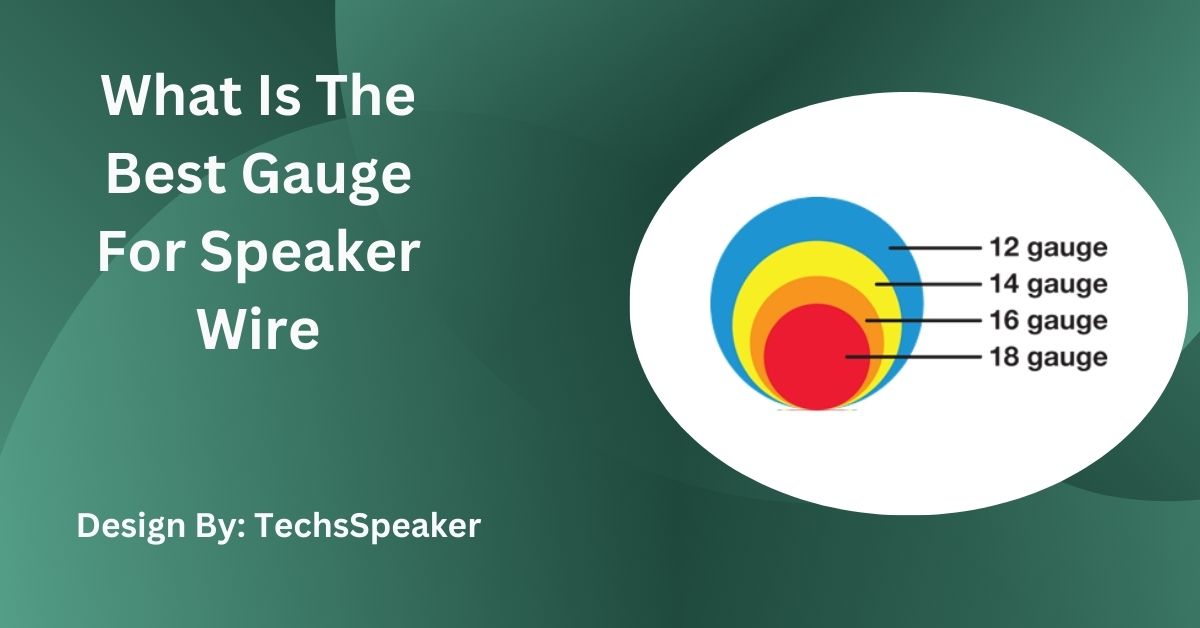To ensure top sound quality, use thicker speaker wires for longer distances. For runs shorter than 50 feet, 16 AWG or 14 AWG wires are sufficient. For distances over 50 feet, choose 12 AWG or 10 AWG wires to prevent signal loss.
When setting up your home audio system, one of the key factors to consider is the speaker wire gauge. This term refers to the thickness of the wire that connects your speakers to your amplifier or receiver. The wire gauge is important because it affects how well the signal travels from your audio equipment to your speakers. Choosing the correct wire gauge can make a big difference in the quality of the sound you hear.

The American Wire Gauge (AWG) system is used to measure speaker wire gauge. In this system, wire thickness is indicated by numbers ranging from 10 to 22. Here’s how it works:
- Lower numbers mean thicker wire. For example, 10-gauge wire is thicker than 12-gauge wire.
- Higher numbers mean thinner wire. For example, 22-gauge wire is thinner than 16-gauge wire.
Thicker wires (with lower gauge numbers) have less resistance to the electrical current flowing through them. This means they can carry the audio signal more effectively, especially over long distances.
Thinner wires (with higher gauge numbers) are fine for shorter distances, where signal loss is less of a concern.
Choosing the right wire gauge depends on a few factors, including how far the wire needs to run and how powerful your audio system is. Here are some general guidelines:
- 12-gauge wire: This thick wire is best for long runs over 50 feet or for systems with very powerful amplifiers. It ensures that the signal remains strong and clear, even over long distances.
- 14-gauge wire: This medium-thickness wire works well for runs between 25 and 50 feet. It’s suitable for most home audio systems.
- 16-gauge wire: This thinner wire is ideal for short runs under 25 feet. It’s perfect for connecting speakers in a small room or for low to moderate power systems.
By choosing the right gauge, you ensure that your speakers get enough power to produce high-quality sound without distortion or signal loss.
Also Read: Integrated Amplifier For Center Speaker – DIY Methods and Tips!
When selecting the right wire gauge for your home speakers, consider these key points:
- Length of the wire run: Longer wires need to be thicker to reduce resistance and keep the signal strong.
- Power output of your amplifier: If your amplifier is very powerful, you’ll need thicker wire to handle the increased current.
- Impedance of your speakers: Speakers with lower impedance (measured in ohms) require thicker wire. For example, 4-ohm speakers need thicker wire than 8-ohm speakers.

Several factors influence the choice of speaker wire gauge:
- Wire length: Longer wires need to be thicker to maintain sound quality.
- Amplifier power: Powerful amplifiers benefit from thicker wires to handle the current.
- Speaker impedance: Lower impedance speakers need thicker wires for proper power delivery.
- Installation environment: Consider the conditions where the wires will be installed. Factors like temperature and humidity can affect wire performance.
Connecting speaker wire to your audio equipment is straightforward. Follow these simple steps:
- Strip the wire ends: Use a wire stripper to remove about half an inch of insulation from both ends of the wire.
- Twist the strands: Twist the exposed strands together to prevent them from fraying.
- Insert into connectors: Insert the twisted wire into the speaker terminals or banana plugs. Make sure the connection is secure.
- Secure the connections: Tighten any screws or clamps to hold the wire in place.
- Test the connection: Play some audio to ensure the speakers are receiving the signal and working correctly.
The length of the speaker wire and the distance between your amplifier and speakers play a crucial role in determining the right wire gauge. Here’s a simple guide:
- For distances under 25 feet, 16-gauge wire is generally sufficient.
- For distances between 25 and 50 feet, use 14-gauge wire.
- For distances over 50 feet, opt for 12-gauge wire to minimize resistance and maintain sound quality.
Speaker wire gauge measures the thickness of the wire, affecting signal strength and quality. Thicker wires (lower gauge numbers) handle longer distances and higher power better.
Wire gauge is crucial because it impacts how well audio signals travel from your amplifier to your speakers, affecting sound quality and preventing signal loss.
For distances under 25 feet, 16 AWG wire is typically sufficient. It balances cost and performance for shorter runs.
For runs over 50 feet, use 12 AWG or 10 AWG wire to minimize resistance and maintain sound quality over longer distances.
Consider wire length, amplifier power, and speaker impedance. Thicker wire is needed for longer distances and higher power systems.
16 AWG wire is generally not recommended for high-power systems or long runs. Use thicker wires like 12 AWG for such applications.
Using wire that is too thin can lead to signal loss, distortion, and reduced audio quality, especially over longer distances.
Strip the wire ends, twist the strands, insert into connectors, secure connections, and test the setup to ensure proper audio signal transmission.
Yes, temperature and humidity can impact wire performance. Ensure wires are suitable for the installation environment to avoid performance issues.
Choosing the right speaker wire gauge is vital for optimal sound quality. Use 16 AWG or 14 AWG wires for distances under 50 feet, and 12 AWG or 10 AWG wires for longer runs to prevent signal loss. By selecting the appropriate gauge, you ensure that your audio system delivers clear and powerful sound without distortion. Consider the length of the run, amplifier power, and speaker impedance for the best performance.
